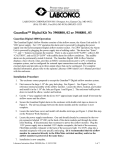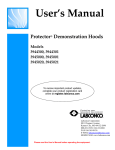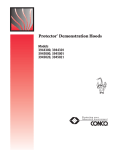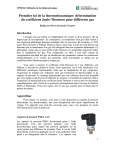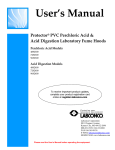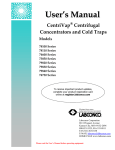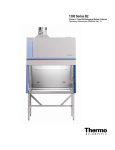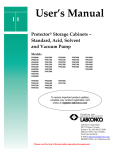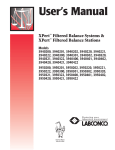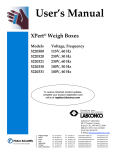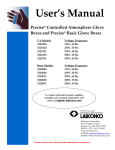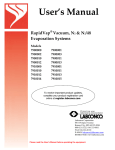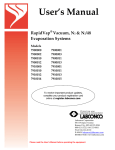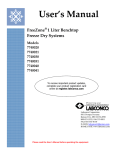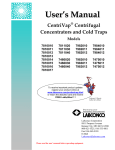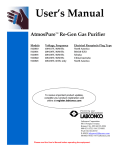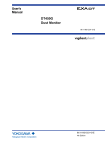Download Chapter 2
Transcript
User’s Manual XPert™ Filtered Balance Enclosures & Protector® XVS™ Ventilation Stations XPert Balance Enclosures Models 2' 3930200, 3930201, 3930202, 3930221, 3930222, 3930230, 3930231, 3930232, 3930241, 3930242 3' 3930300, 3930301, 3930302, 3930321, 3930322, 3930330, 3930331, 3930332, 3930341, 3930342 4' 3930400, 3930401, 3930402, 3930421, 3930422, 3930430, 3930431, 3930432, 3930441, 3930442 5' 3971500, 3971501, 3971502, 3971521, 3971522, 3971530, 3971531, 3971532, 3971541, 3971542 3971560, 3971561, 3971562, 3971571, 3971572 6' 3971600, 3971601, 3971602, 3971621, 3971622, 3971630, 3971631, 3971632, 3971641, 3971642, 3971660, 3971661, 3971662, 3971671, 3971672 8' 3971800, 3971801, 3971802, 3971821, 3971822 3971830, 3971831, 3971832, 3971841, 3971842 3971860, 3971861, 3971862, 3971871, 3971872 XVS Ventilation Stations 2' 4862010, 4862011, 4862012, 4862021, 4862022, 4862030, 4862031, 4862032, 4862041, 4862042 3' 4863010, 4863011, 4863012, 4863021, 4863022, 4863030, 4863031, 4863032, 4863041, 4863042 4' 4864010, 4864011, 4864012, 4864021, 4864022, 4864030, 4864031, 4864032, 4864041, 4864042 5' 4865010, 4865011, 4865012, 4865021, 4865022, 4865030, 4865031, 4865032, 4865041, 4865042, 4865060, 4865061, 4865062, 4865071, 4865072 6' 8' 4866010, 4866011, 4866012, 4866021, 4866022, 4866030, 4866031, 4866032, 4866041, 4866042, 4866060, 4866061, 4866062, 4866071, 4866072 4868010, 4868011, 4868012, 4868021, 4868022, 4868030, 4868031, 4868032, 4868041, 4868042, 4868060, 4868061, 4868062, 4868071, 4868072 To receive important product updates, complete your product registration card online at register.labconco.com Please read the User’s Manual before operating the equipment. Labconco Corporation 8811 Prospect Avenue Kansas City, MO 64132-2696 800-821-5525, 816-333-8811 Fax 816-363-0130 E-Mail [email protected] Home Page www.labconco.com Copyright © 2004, 2007, 2009, 2010 Labconco Corporation. All rights reserved. The information contained in this manual and the accompanying products are copyrighted and all rights reserved by Labconco Corporation. Labconco Corporation reserves the right to make periodic design changes without obligation to notify any person or entity of such change. Warranty Labconco provides a warranty on all parts and factory workmanship. The warranty includes areas of defective material and workmanship, provided such defect results from normal and proper use of the equipment. The warranty for all Labconco products will expire one year from date of installation or two years from date of shipment from Labconco, whichever is sooner, except the following; • Purifier® Logic™ Biological Safety Cabinets and PuriCare® Lab Animal Research Stations carry a three-year warranty from date of installation or four years from date of shipment from Labconco, whichever is sooner. • SteamScrubber® & FlaskScrubber® Glassware Washers carry a two-year warranty from date of installation or three years from date of shipment from Labconco, whichever is sooner. • Blood Drawing Chairs carry a ten year warranty. • Carts carry a lifetime warranty. • Glassware is not warranted from breakage when dropped or mishandled. This limited warranty covers parts and labor, but not transportation and insurance charges. In the event of a warranty claim, contact Labconco Corporation or the dealer who sold you the product. If the cause is determined to be a manufacturing fault, the dealer or Labconco Corporation will repair or replace all defective parts to restore the unit to operation. Under no circumstances shall Labconco Corporation be liable for indirect, consequential, or special damages of any kind. This statement may be altered by a specific published amendment. No individual has authorization to alter the provisions of this warranty policy or its amendments. Lamps and filters are not covered by this warranty. Damage due to corrosion or accidental breakage is not covered. Returned or Damaged Goods Do not return goods without the prior authorization from Labconco. Unauthorized returns will not be accepted. If your shipment was damaged in transit, you must file a claim directly with the freight carrier. Labconco Corporation and its dealers are not responsible for shipping damages. The United States Interstate Commerce Commission rules require that claims be filed with the delivery carrier within fifteen (15) days of delivery. Limitation of Liability The disposal and/or emission of substances used in connection with this equipment may be governed by various federal, state, or local regulations. All users of this equipment are required to become familiar with any regulations that apply in the user’s area concerning the dumping of waste materials in or upon water, land, or air and to comply with such regulations. Labconco Corporation is held harmless with respect to user’s compliance with such regulations. Contacting Labconco Corporation If you have questions that are not addressed in this manual, or if you need technical assistance, contact Labconco’s Customer Service Department or Labconco’s Product Service Department at 1-800-8215525 or 1-816-333-8811, between the hours of 7:00 a.m. and 6:00 p.m., Central Standard Time. Part #3901000, Rev. F ECO F773 TABLE OF CONTENTS CHAPTER 1: INTRODUCTION 1 CHAPTER 2: PREREQUISITES Support, Vibration and Movement Requirements Temperature Variation Requirements Humidity and Static Electricity Requirements Location and Air Current Requirements Exhaust and Blower Requirements Remote Blowers (Roof Mounted) FilterMate Portable Exhausters Electrical Requirements Space Requirements 2 3 3 4 5 6 7 8 9 9 CHAPTER 3: GETTING STARTED Unpacking the Enclosure Install the Enclosure on a Supporting Structure & Work Surface Connecting to the Vented Enclosure Exhaust System Connecting the Electrical Supply Sealing the Vented Enclosure to the Work Surface Validating the Vented Enclosure 10 11 11 13 17 17 17 CHAPTER 4: HIGH PERFORMANCE FEATURES AND SAFETY PRECAUTIONS High Performance Features Safety Precautions 18 18 24 CHAPTER 5: USING YOUR ENCLOSURE 25 CHAPTER 6: MAINTAINING YOUR ENCLOSURE Routine Maintenance Schedule Guardian 500 Airflow Monitor Kit No. 3944700 or 3944701 Guardian 500 Component Identification Guardian 500 Installation Procedure Guardian 500 Calibration Procedure Guardian 500 Alarm Activation Guardian Digital 1000 Kit No. 3908800 or 3908801 Guardian Digital 1000 Operation Guardian Digital 1000 Installation Procedure Guardian Digital 1000 Calibration Digital 1000 Alternate Calibration Procedure – Constant Volume Conditions 27 28 28 29 30 32 32 34 34 34 37 38 CHAPTER 7: ACCESSORIZING YOUR ENCLOSURE Work Surfaces Guardian Digital Airflow Monitor or Guardian 500 Fluorescent Light Kit Exhaust Transition Adapters & Dual Exhaust Connectors Remote Blowers Exhaust Dampers FilterMate Portable Exhausters and Filters Storage Cabinets Utility Shelf Kit Hose, Hose Clamps and Hose Kits 41 43 43 43 44 44 45 45 46 47 47 CHAPTER 8: TROUBLESHOOTING 48 APPENDIX A: REPLACEMENT PARTS 49 APPENDIX B: DIMENSIONS 52 APPENDIX C: SPECIFICATIONS 53 APPENDIX D: BALANCE STABILITY 54 DECLARATION OF CONFORMITY 55 Chapter 1: Introduction Congratulations on your purchase of a Labconco XPert™ Balance Enclosure or Protector® XVS™ Ventilation Station. Your high performance enclosure is designed to protect you by providing superior containment while conserving energy at OSHA approved “low flow” velocities as low as 60 feet per minute. It is the result of Labconco’s more than 50 years experience in manufacturing fume hoods. The XPert Balance Enclosure or Protector XVS Ventilation Station has been engineered to provide maximum containment. It will effectively contain toxic, noxious, or other harmful materials when properly installed. The XPert or XVS offers many unique features to enhance safety, performance, and energy savings. To take full advantage of them, please acquaint yourself with this manual and keep it handy for future reference. If you are unfamiliar with how high performance vented enclosures operate, please review Chapter 4: High Performance Features and Safety Precautions before you begin working in the enclosure. Even if you are an experienced user, please review Chapter 5: Using Your Vented Enclosure, which describes the XPert or XVS features so that you can use the vented enclosure efficiently. 3' XPert Filtered Balance Enclosure 3930302 is shown with Black Solid Epoxy Work Surface 3908401 and Protector Standard Storage Cabinet 9900100. Work Surface, base cabinet, blower and ductwork or FilterMate Portable Exhauster must be ordered separately. Product Service 1-800-522-7658 1 Chapter 2: Prerequisites Before you install the vented enclosure, you need to prepare your site for installation. Carefully examine the location where you intend to install the vented enclosure. You must be certain that the area is level and of solid construction. In addition, a dedicated source of electrical power should be located near the installation site to power the accessory FilterMate Portable Exhauster, balance or other apparatus. Additionally, a balance should be strategically placed in the lab to provide efficient workflow. Carefully read this chapter to learn the requirements for your installation site: • The support, vibration and movement requirements. • The temperature variation requirements. • The humidity and static electricity requirements. • The location and air current requirements. • The exhaust and blower requirements. • The electrical power requirements. • The space requirements. Refer to Appendix B: XPert/XVS Dimensions for complete enclosure dimensions. Refer to Appendix C: XPert/XVS Specifications for complete vented enclosure electrical and environmental conditions, specifications and requirements. 2 Product Service 1-800-522-7658 Chapter 2: Prerequisites Support, Vibration and Movement Requirements At a minimum, the supporting structure usually consists of a base cabinet and chemically resistant work surface. XPert and XVS: • When setting up a chemical station not used for weighing powders, a mobile stand or cart is allowable. The ability for analytical balances to accommodate vibration varies with type and brand. More advanced balances have improved reliability, however in the preparation of a balance enclosure site, please consider the following: • Avoid tubular stands or carts that have the potential of moving when touched. • Work surfaces should be of a thick rigid material that remains stable when buttons are pressed. An epoxy benchtop or accessory work surface is a minimum requirement. • A bench that is rigidly mounted to the floor or fixed to the wall, but not both, may be appropriate. • The corners of a building typically have less vibration than the center. • The bench with the balance enclosure should not contain any vibrationproducing equipment, such as shakers or pumps. • Marble, granite or epoxy balance tables are generally recommended by the manufacturers of analytical and microbalances. (See the installation instructions in Chapter 3). • Marble slabs within the balance enclosure with dampening pads are also an effective low cost means of controlling vibration. Temperature Variation Requirements XPert: The extent the balance readings are influenced by temperature variations is a function of the balance design. Most manufacturers would suggest that a temperature drift of 1-2°C is generally tolerable. Only validation through your Operational Qualification protocol can define what is acceptable. To minimize the potential for temperature variations: Product Service 1-800-522-7658 3 Chapter 2: Prerequisites • Never install balances near heating sources such as radiators and hot plates. • Avoid incandescent lighting of the enclosure where radiant heat produced will raise temperatures. (See Chapter 7 for adding an accessory fluorescent light kit). • Do not place the balance and enclosure on a bench that would receive direct sunlight. Humidity and Static Electricity Requirements XPert: Electrostatics can be troublesome in a balance enclosure. It is important to understand and, to the extent possible, control static charges. An electrostatic charged vessel, sample or enclosure can apply forces and lead to errors in weighing. The repulsion or attraction can be detected with micro, semi micro and analytical balances. Static charges can also lead to particulates being attracted to surfaces within the balance enclosure. Containment of harmful powders, prevention of cross-contamination and clean up is all enhanced when static attraction of powders is minimized. The construction of the XPert Balance Enclosure avoids the use of plastics, which are highly insulative. The advantages to the glass and epoxy-coated metal construction are twofold. 1. The enclosure does not contribute high electrostatic forces affecting the precision of the balance. 2. The attraction and ultimate accumulation of powders, (hazardous or nuisance), are minimized on the inside of the enclosure. To correct or ensure against electrostatic issues, the following additional measures may be prescribed to improve weighing operations. • Maintain a humidity level between 45 and 60%. The ability to sustain this humidity range can be challenging depending upon the regional climate and HVAC system. • Ionizers in various forms (guns, bars and blowers) are effective ways to flood an area with ions and essentially “neutralize” electrostatic electricity. 4 Product Service 1-800-522-7658 Chapter 2: Prerequisites Background on Electrostatics or Static Electricity Electrostatic charges on a surface such as the wall of a balance enclosure are not created by moving air. Gases do not cause the charge. Impurities within the air impinging upon surfaces dictate the polarity and magnitude of the charge. The process, triboelectrification, occurs when the friction of the dust particles contact the surface and electrons move across the interface. The ability of a material to become polarized is a property known as permittivity. On highly insulative materials like acrylic, ions or charged molecules are strongly bound to the surface by polarization forces. The higher the force, the higher is the permittivity value of the material. It is suggested that the use of high permittivity materials, such as plastic be avoided. Since static electricity is a surface phenomenon, materials can also be classified by their surface resistivity measured in ohms per square. The table below lists the surface resistivity of various classes of material. Surface Resistivity Table Material Conductive Static dissipative Antistatic Insulative Surface Resistivity 0 → 105 Ω per square 105 → 109 Ω per square 109 → 1012 Ω per square 1012 Ω per square→ Example Skin, Metals Glass Polyethylene bag Acrylic, Packing foam, Styrofoam Location and Air Current Requirements The XPert Balance Enclosure and XVS Ventilation Station both have been designed to contain hazards by negating typical cross drafts and movements within the opening. Air movement does not affect most modern balances with draft shields. However, as a precautionary measure of safety and a higher level of quality management, it is recommended that the enclosure be placed in such an area to avoid: • High traffic areas where walking might cause an air disturbance or be a nuisance to balance readings. • Overhead or wall HVAC diffusers, fans, radiators or other lab equipment producing air currents. • Next to doorways or windows that may be opened. Product Service 1-800-522-7658 5 Chapter 2: Prerequisites Exhaust and Blower Requirements The exhaust connection has been designed to accept a 2" x 10" (5.1cm x 25.4cm) nominal exhaust collar. The enclosure has two possible exhaust connections with either the top exhaust open and the bottom exhaust closed or vise versa. The bottom exhaust connection is primarily used in installations where the hose or ductwork needs to be concealed. Labconco offers accessory transition adapters for the top or bottom exhaust connection to either a 5" hose or 6" duct. See Chapter 7 for ordering any of these accessories. For house exhaust, only one exhaust connection is required for the 2' through 6' enclosures and two exhaust connections are required on the 8' enclosure. Data for the exhaust volume and enclosure static pressure loss are listed for each enclosure model at face velocities of 60, 80 and 100 fpm. When using the accessory FilterMate Portable Exhausters, it requires the 5" Transition Adapter 3912400, which is sold with the FilterMate. Multiple FilterMate Portable Exhausters require the airflow to be properly balanced. The 5', 6' and 8' enclosures require two or three FilterMate Portable Exhausters dependent on face velocity and size. Enclosure Width Enclosure Height 2' 22.75" 8" Sash 2' XPert/2' XVS 3' 22.75" 8" Sash 3' XPert/3' XVS 4' 22.75" 8" 4' XPert/4' XVS 2' 32" 10" Sash Tall 2' XPert/2' XVS 3' 32" 10" Sash Tall 3' XPert/3' XVS 4' 32" 10" Sash Tall 4' XPert/4' XVS 5' 22.75" 8" Sash 5' XPert 6' 22.75" 8" Sash 6' XPert 8' 22.75" 8" Sash 8' XPert 5' 32" 12" Sash Tall 5' XPert 6' 32" 12" Sash Tall 6' XPert 8' 32" 12" Sash Tall 8' XPert 6 Model Description Face Velocity (fpm) 60 80 100 60 80 100 60 80 100 60 80 100 60 80 100 60 80 100 60 80 100 60 80 100 60 80 100 60 80 100 60 80 100 60 80 100 Exhaust Volume (CFM) 70 95 120 110 145 185 150 200 250 90 120 150 140 185 230 185 250 310 190 250 315 230 305 380 310 410 510 290 385 480 350 465 580 465 620 775 Static Pressure Loss (in w.g.) .02" .03" .05" .04" .06" .10" .06" .10" .16" .03" .05" .08" .06" .10" .15" .09" .16" .24" .08" .15" .23" .12" .21" .32" .07" .12" .18" .20” .35" .54" .27" .48" .75" .15" .27” .42" Number of Required FilterMates 1 1 1 1 1 1 1 1 1 1 1 1 1 1 1 1 1 N/A 1 1 2 1 2 2 2 2 3 2 2 3 2 3 3 3 3 3 Product Service 1-800-522-7658 Chapter 2: Prerequisites Proper blower selection can be determined from these exhaust requirements and the total system static pressure loss. The enclosure must be connected to a dedicated blower, a house exhaust system or a dedicated filtered exhauster, such as a Labconco FilterMate. When using multiple FilterMates, the airflow must be balanced. Labconco offers accessory remote blowers listed next and in Chapter 7. Remote Blowers (Roof-Mounted) A). 1/4 hp direct drive. Corrosion-resistant epoxy-coated steel housing and wheel. Blower inlet is 6" ID. Outlet dimensions are a rectangular 4.25" x 7.38" OD. See dimensional data in Chapter 7. S.P. CFM Catalog # 4863500 4863501 7053501 0.0" 595 CFM @ Static Pressure – Inches of H2O 0.125" 0.25" 0.50" 0.75" 560 515 420 300 Description Remote Blower, 115 volts, 60 Hz, 4.4 amps Remote Blower, 115/230 volts, 50 Hz, 5.6/2.8 amps Explosion-Proof Remote Blower, 115 volts, 60 Hz, 4.4 amps 0.87" 167 Shipping Wt. lbs./kg 35/16 35/16 40/18 B). 1/4 hp or 1/3 hp belt drive with adjustable sheave to change RPM. Corrosion-resistant epoxy-coated steel housing and wheel. Blower inlet is 10.87" ID. Outlet dimensions are a rectangular 5.5" x 10" OD. See dimensional data in Chapter 7. Catalog # Std. EP HP .25" 1/4 7068200 7068300 1/4 1/3 7068400 7068500 Description 1/3 Remote Blower, 115V, 60 Hz, 4.4 A Explosion Proof Blower 115V, 60 Hz, 4.5 A Remote Blower, 115V, 60 Hz, 6.1 A Explosion Proof Blower, 115V, 60 Hz, 6.4 A .38" CFM@RPM Ranges at Static Pressure (in H20) .50" .62" .75" .88" 1.00" 540@800 410@800 350@870 390@970 430@1060 720@950 760@1050 710@1060 620@1060 760@1050 710@1060 620@1060 430@1060 460@1150 500@1220 850@1130 825@1160 790@1190 770@1220 740@1260 640@1260 If the enclosure is connected directly to a house exhaust system, an adjustable damper (or valve) must be installed to control the airflow properly. This is equally important when a house exhaust system is controlling multiple balance enclosures or ventilation stations. See Chapter 7 for ordering an accessory adjustable damper. Product Service 1-800-522-7658 7 Chapter 2: Prerequisites FilterMate Portable Exhausters (Filtered Room Exhaust or Outside) For filtered exhauster selection, Labconco offers FilterMate Portable Exhausters capable of exhausting up to 280 cfm of HEPA filtered air or up to 220 cfm of combination HEPA/Carbon filtered air. These airflows are possible when connected to the enclosure with 8' of 5" diameter hose. HEPA and Carbon filters are available and detailed below, as well as in Chapter 7. For airflows greater than these listed use multiple FilterMates. Labconco offers FilterMate Portable Exhausters listed below and in Chapter 7. FilterMate Portable Exhausters Catalog Number 3970000 3970001 Voltage 115 Volt/60 Hz 115 Volt/60 Hz Filter HEPA Carbon Exhaust Airflow (cfm) 280 280 3970002 3970003 3970004 3970020 3970021 115 Volt/60 Hz 115 Volt/60 Hz 115 Volt/60 Hz 230 Volt/50 Hz 230 Volt/50 Hz HEPA HEPA/Carbon Carbon/Carbon HEPA Carbon 280 220 220 280 280 3970022 3970023 3970024 230 Volt/50 Hz 230 Volt/50 Hz 230 Volt/50 Hz HEPA HEPA/Carbon Carbon/Carbon 280 220 220 Exhaust Connection None None Canopy to outside None None None None Canopy to outside None None If the outlet of the FilterMate Exhauster is connected to the house exhaust system it is recommended that 3970002 (115 Volt) or 3970022 (230 Volt) be ordered as a thimble connection is built into the exhaust with a 6" nominal exhaust. HEPA Filter Part #3707900 is 99.99% efficient for particles 0.3 micron. HEPA Filter with Bag-In/Bag-Out Bag Part #3779002. Helps contain particulate matter during filter changing operations. Carbon Filters Provides granular activated carbon or treated carbon. Filter Classification Organic Vapors Formaldehyde Ammonia 8 Part # 3923400 3923401 3923402 Carbon lbs. 12# activated 14# treated 16# treated Product Service 1-800-522-7658 Chapter 2: Prerequisites Electrical Requirements Standard duplex electrical receptacles should be nearby for connecting the FilterMate Portable Exhauster, an airflow monitor, accessory fluorescent light or other equipment, such as a balance for weighing operations. For your convenience both the accessory FilterMate and accessory fluorescent light kit have auxiliary outlet receptacles. It is recommended that the airflow monitor be connected directly to the auxiliary switched outlet on the rear of the FilterMate so the airflow monitor is ON when the blower is ON. The FilterMate auxiliary switched outlet is rated for 8 amps. For other blower exhaust systems, it is recommended that the airflow monitor be switched by the same circuit as the blower exhaust. If this is not possible, then the airflow monitor may be connected to the switched auxiliary outlet on the accessory fluorescent light kit. The fluorescent light kit auxiliary outlet can be used for any accessory under 8 amps. Space Requirements The dimensions for the different models are shown in Appendix B: Enclosure Dimensions. Product Service 1-800-522-7658 9 Chapter 3: Getting Started Now that the site for your XPert or XVS vented enclosure is properly prepared, you are ready to unpack, inspect, install, and validate your system. Read this chapter to learn how to: • Unpack and move the enclosure. • Set up the enclosure with the proper supporting structure and work surface. • Connect to an exhaust system. • Connect the electrical supply. • Seal the enclosure to the work surface. • Arrange validation for the enclosure. Depending upon which model you are installing, you may need common plumbing and electrical installation tools in addition to 5/16", 3/8", 7/16", and 1/2" wrenches, ratchets, sockets, a nut driver set, a flat-blade screwdriver, a Phillips screwdriver, and a carpenter level to complete the instructions in the chapter. Note: The enclosure models weigh between 50 to 200 lbs. each (22 to 90 kg). The shipping container allows for lifting with a mechanical lift truck or floor jack. if you must lift the enclosure manually, follow safelifting guidelines. Do not lift by the front Air Foil. 10 Product Service 1-800-522-7658 Chapter 3: Getting Started Unpacking the Enclosure Carefully remove the shrink-wrap or carton on the enclosure and inspect it for damage that may have occurred in transit. If damaged, notify the delivery carrier immediately and retain the entire shipment intact for inspection by the carrier. • Do not return goods without the prior authorization of Labconco. Unauthorized returns will not be accepted. • If enclosure was damaged in transit, you must file a claim directly with the freight carrier. Labconco Corporation and its dealers are not responsible for shipping damages. • The United States Interstate Commerce Commission rules require that claims be filed with the delivery carrier within fifteen (15) days of delivery. • Do not discard the packing material until you have checked all of the components and tested the unit. • We recommend that you do not remove the enclosure from its shipping container until it is ready to be placed into its final location. Move the unit by placing a flat, low dolly under the shipping skid, or by using a floor jack. NOTE: DO NOT MOVE THE ENCLOSURE BY TILTING IT ONTO A HAND TRUCK. Install the Enclosure on a Supporting Structure and Work Surface Note: Use caution when lifting or moving the enclosure. When installing the enclosure onto a work surface or benchtop, ensure that the structure can safely support the combined weight of the enclosure and any related equipment. The work surface should be at least as wide as the enclosure to properly support it. The front of the enclosure should be aligned within 1/8" of the front of the work surface. Mounting holes are provided in the Labconco accessory work surfaces to secure the enclosure. Product Service 1-800-522-7658 11 Chapter 3: Getting Started Work Surface Specifications The work surface should be smooth, rigid, and durable, such as a chemically resistant epoxy resin or stainless steel. The surface should be non-porous and resistant to the acids, solvents and chemicals used in conjunction with the XPert or XVS enclosure. The work surface should also contain a dished recessed area for containing primary spills. Work Surface and Vented Enclosure Installation 1. Level the base cabinets and the work surface. Work surface should be placed flush with the front of the base cabinet as shown in Figure 3-1. 2. Position the work surface in its intended location and with the front of the work surface, (wide flange or spill trough), towards you. 3. Secure the work surface to the base cabinet with a structural adhesive or silicone sealant. 4. Insert the supplied mounting screws in the four holes for epoxy work surfaces. For stainless steel work surfaces use #10-24 x 3/8" hex machine screws. (Labconco P/N 1885806). Allow a minimum of 1/8" clearance under the head of the screw for positioning the enclosure. 5. Place the enclosure on the work surface and slide the rear flange and front air foil flanges under the mounting screw heads. 6. Tighten the four screws to complete the installation. Airflow monitor moved forward per Chapter 6. Figure 3-1 Side View of Typical Installation 12 Product Service 1-800-522-7658 Chapter 3: Getting Started Connecting to the Vented Enclosure Exhaust System WARNING: The weight of the exhaust ductwork system must be supported independently of the enclosure superstructure or damage may occur. The exhaust system should be installed by a qualified HVAC contractor. The exhaust connection on the 2' through 6' enclosures has been designed to accept a 2" x 10" (5.1cm x 25.4cm) nominal transition adapter. The 8' enclosure has two 2" x 10" connections. See Chapter 7 for ordering accessory transition adapters. Labconco manufactures transition adapters for either top or bottom exhaust and for both 5" dia. hose or 6" dia. duct. Review Chapter 2 for remote blower and FilterMate Portable Exhauster exhaust prerequisites and review Chapter 7 for ordering blower exhaust equipment. For your convenience several exhaust options are shown in Figures 3-2, 3-3, 3-4 and 3-5. Consult Labconco Customer Service should you require help sizing your blower for the exhaust volume and system static pressure loss. To ensure compatibility, the selected exhaust duct material should match the enclosures, procedures and chemical applications. Figure 3-2 Top Connection to Outside Exhaust 6.03" ID Exhaust Transition Adapter Airflow monitor moved forward per Chapter 6. Product Service 1-800-522-7658 13 To Outside Exhaust Chapter 3: Getting Started Airflow monitor moved forward per Chapter 6. Figure 3-3 Front View and Side View of Concealed Bottom Connection to Outside Exhaust 14 Product Service 1-800-522-7658 Chapter 3: Getting Started Exhaust Transition Adapter Accessory Fluorescent Light Accessory Airflow Monitor (Moved forward per Chapter 6) 5" ID Hose included with FilterMate FilterMate Portable Exhauster Figure 3-4 Top Connection to FilterMate Portable Exhauster Exhausted to Room Product Service 1-800-522-7658 15 Chapter 3: Getting Started Airflow monitor moved forward per Chapter 6. To Outside Exhaust Via Thimble Connection (6" nominal) Figure 3-5 Concealed Bottom Connection to FilterMate With Outside Thimble Exhaust Connection 16 Product Service 1-800-522-7658 Chapter 3: Getting Started Connecting the Electrical Supply A standard duplex receptacle should be nearby for connecting the FilterMate Portable Exhauster, airflow monitor and accessories. Please review Chapter 2 for electrical prerequisites. ALL WIRING FOR THE BUILDING DUPLEX OUTLETS SHOULD BE PERFORMED BY A LICENSED ELECTRICIAN AND CONFORM TO ALL LOCAL CODES. Sealing the Vented Enclosure to the Work Surface When the enclosure has been set in place, ducted and wired, it may be sealed at the work surface to prevent spilled materials from collecting under the walls. A bead of silicone sealant is recommended to seal the enclosure to the work surface. Validating the Vented Enclosure The exhaust damper ductwork, exhaust blower or FilterMate gives you the flexibility to change the airflow at the sash opening of your enclosure. To determine the actual face velocity at the sash opening, airflow velocity readings will need to be taken. This should be done across the sash opening of the enclosure in accordance with the Industrial Ventilation Manual. (See Appendix D) The “average face velocity” is achieved by taking readings in two rows across the enclosure with the readings 6" from the ends and evenly spaced every 12"; the first row is 3" down from the upper sash foil and the second row is 3" up from the work surface. Labconco recommends an average face velocity at the sash opening of 60 to 100 feet per minute for high performance XPert and Protector XVS enclosures. Refer to Chapter 2 for proper airflow volumes for your particular model. Your XPert or XVS enclosure has been tested at the factory per ASHRAE 110-1995. All enclosures achieve an “as manufactured rating” of less than 0.05 part per million (ppm) at 4 liters per minute (lpm); AM <0.05 (Consult Labconco for individual ratings). For “field use” ASHRAE testing contact Labconco for a certified on-site contractor. For additional validation, Labconco had independent testing performed to validate the enclosures for sodium naproxen powder containment. Labconco also had independent ASHRAE testing performed to validate the enclosures for gas containment. For copies of these independent validation reports, contact Labconco Customer Service. NOTE: Face velocity profiles and smoke testing should be performed frequently per your organizations quality system to ensure safe performance. Product Service 1-800-522-7658 17 Chapter 4: High Performance Features and Safety Precautions High Performance Features: The patented (U.S. Patent No. 6,461,233) XPert Balance Enclosure and Protector XVS Ventilation Station are designed to meet the needs of the laboratory scientist, and provide superior containment while conserving energy at OSHA approved “low flow” velocities as low as 60 feet per minute. The XPert/XVS Enclosure has been designed to effectively contain toxic, noxious, or other harmful materials when properly installed and operated. What makes the XPert/XVS Enclosure so unique is the revolutionary way it directs air into and through the contaminated air chamber. Labconco engineered the XPert/XVS to minimize the effects of turbulence. The containment enhancing and aerodynamic designs of the upper sash foil, side air foils, lower air foil, upper dilution air supply, and rear perforated baffle all work in concert to produce horizontal airflow patterns that significantly reduce both powder and chemical concentrations through the work area. These concentrations of materials are predominantly removed on the “first pass” of airflow through the chamber resulting in high performance containment. 18 Product Service 1-800-522-7658 Chapter 4: Performance Features and Safety Precautions 4 12 14 Airflow monitor moved forward per Chapter 6. 13 3 6 2 8 5 1 10 9 7 5 16 Figure 4-1 Product Service 1-800-522-7658 19 Chapter 4: Performance Features and Safety Precautions 1. Aerodynamic Clean-Sweep™ Air Foil has a unique low profile shape that allows air to sweep the work surface for maximum containment. The Clean-Sweep™ openings create a constant protective barrier from contaminants. In addition, should the operator inadvertently block the airflow entering the airfoil, air continues to pass under the air foil and through the Clean-Sweep openings. See Figure 4-2. Figure 4-2 2. Containment-Enhancing Upper Sash Foil includes a perforated air passage directly atop the sash foil to bleed air into the hood chamber and direct chemical and powder concentrations away from the sash opening. The radiused sash foil sweeps airflow into the hood with minimal turbulence. See Figure 4-3. Figure 4-3 20 Product Service 1-800-522-7658 Chapter 4: Performance Features and Safety Precautions 3. Upper Dilution Air Supply provides bypass air from above the work area. This feature constantly bathes the sash interior with clean air and reduces powders and chemical fumes along the sash plane, near the critical breathing zone. Five to seven percent of the required air volume is introduced through the upper dilution air supply to ensure maximum containment. Additionally, the upper dilution air supply reduces stagnant pockets of air in the upper interior. See Figure 4-4. Figure 4-4 4. Zoned Rear Perforated Baffle directs horizontal laminar air streams to the three-zoned sections of the perforated baffle in a single pass. The three-zoned sections have increasingly more airflow at the bottom that helps form the laminar airflow. This smooth horizontal flow minimizes the potential for air to roll forward preventing contamination from moving toward the sash opening. The concentrations of materials are largely removed on the first pass through the contaminated chamber. The zoned rear perforated baffle may be removed or tilted down for cleaning. See Figure 4-5. Product Service 1-800-522-7658 21 Chapter 4: Performance Features and Safety Precautions Figure 4-5 5. Side Entry Air Foils allow turbulence free air to enter the enclosure from the sides and allow clean air to sweep the interior walls of the enclosure. 6. Ergonomic Slope provides maximum visibility, and comfort reduces glare, thereby minimizing operator fatigue. 7. Internal Depth of 23" provides necessary depth to support modern balances and other auxiliary equipment without extending outside the enclosure or resting on the lower air foil. 8. Two Enclosure Heights and Depths available as standard enclosures in 22.75" or 32". Taller height XVS enclosures are typically used for pipet operations, titration or taller auxiliary equipment. Unit depth of 29" is available on 2' through 8' enclosures and 35.5" depth is available on 5', 6', and 8' enclosures. 9. Unique Flush Sash has a wiping seal to contain contaminants and features a spring-loaded latch or gas spring for loading auxiliary equipment. The sash pivots down for normal operation. 22 Product Service 1-800-522-7658 Chapter 4: Performance Features and Safety Precautions 10. Electrical Pass through Iris allows electrical cords and data cords to pass through the back of enclosure without leaving a large hole for contaminants to escape. The unit ships with solid plugs and the iris plugs are included with the instruction manual for your convenience. 11. Shipped fully assembled to eliminate the need for costly onsite assembly. Accessories such as the exhaust transition connections, work surfaces, airflow monitors and fluorescent light kits are easily installed. 12. Accessory Exhaust Connections. The XPert/XVS enclosures feature two exhaust locations: One is located on the top of the rear plenum and the other is located on the bottom of the rear plenum. Exhaust transition connectors are available for either a 6" OD outside exhaust or a 5" ID hose; 5', 6' and 8' enclosures have multiple exhaust connections. All exhaust transition connectors are reviewed in Chapters 2 and 3 and accessories displayed for order in Chapter 7. 13. Accessory Guardian™ Airflow Monitors continuously monitor airflow. An audio/visual alarm alerts the user to low airflow conditions. The Guardian™ Digital Airflow Monitor also displays a face velocity value, provides an RS232 output, a night setback mode and several auxiliary relay ports. See Chapter 7 for ordering information. See Chapter 6 for detailed information, installation, and calibration. 14. Accessory Fluorescent Light Kits provide excellent illumination with an auxiliary outlet plug for supplying power to auxiliary equipment such as a balance or printer. See Chapter 7 for ordering information. 15. Accessory Roof-Mounted Blower sized to provide adequate airflow to XPert/XVS enclosures when used with an exhaust damper. See Chapters 2, 3 and 7. 16. Accessory FilterMate Portable Exhauster provides up to 280 cfm for HEPA filtration or up to 220 cfm for combination HEPA/Carbon filtration when connected to XPert/XVS enclosures. Multiple FilterMates must be balanced and can be used on 5', 6' and 8' units with multiple exhaust connections. See Chapters 2, 3 and 7. Product Service 1-800-522-7658 23 Chapter 4: Performance Features and Safety Precautions Safety Precautions Although the enclosure has been engineered to maintain optimum operator safety, caution should always be used while working. Prior to using the enclosure, check to make sure that the exhaust blower is operating and that air is entering the enclosure at its specified face velocity. The use of an airflow monitor is recommended to alert the user if there is a problem with airflow. Use good housekeeping in the hood at all times. Clean up spills immediately. Periodically clean enclosure interior. Do not overload the work surface with apparatus or work material. The safe operation of the enclosure is based upon having proper airflow through the structure. Do not place large, bulky objects such as block heaters, directly on the work surface. Instead, elevate the object 3/4" on blocks to allow a flow of air under the object and into the rear baffle exhaust slots. Ensure blocks are level and secured in place. Blocking large portions of the rear baffle will change the airflow pattern in the enclosure causing turbulence. (Do not store containers or supplies against the rear baffle, as this will affect airflow). Always work with your hands as far back in the enclosure as possible. It is best to keep all powders, chemicals and apparatus inside the lower air foil of the enclosure. Do not work with chemicals in this enclosure without the exhaust system running. Perchloric acid use in this enclosure is prohibited. High-level radioisotope materials are prohibited in this enclosure. Avoid cross drafts and limit traffic in front of the enclosure. Air disturbances created may draw contaminants out of the enclosure. A qualified certification technician should test the XPert Balance Enclosure or Protector XVS Ventilation Station before it is initially used. The enclosure should be validated whenever it is relocated, serviced or at least annually thereafter. The use of safety goggles, protective clothing, gloves and any other personal protective equipment recommended by your safety officer should be used. The sash should remain in the down position while using the enclosure. Proper operation of the enclosure depends largely upon its location and the operator’s work habits. Consult the references in Appendix D. 24 Product Service 1-800-522-7658 Chapter 5: Using Your Xpert Balance Enclosure or Protector XVS Ventilation Station Planning • Thoroughly understand procedures and equipment required before beginning work. • Arrange for minimal disruptions, such as room traffic or entry into the room while the enclosure is in use. Start-up • Turn on exhaust system and accessory light if so equipped. • Only raise the sash for loading. • Check the baffle air slots for obstructions. • Allow the enclosure to operate unobstructed for 1 minute. • Wear a long sleeved lab coat and rubber gloves. Use protective eyewear. Wear a protective mask if appropriate. Consult your Safety Officer for additional personal protective equipment recommendations. Loading Materials and Equipment • Only load the materials required for the procedure. Do not overload the enclosure. • Do not obstruct the air foil, or rear baffle slots. • Large objects should not be placed close together and should be elevated above the work surface to permit airflow to sweep under the equipment. • After loading, wait one minute to purge airborne contaminants from the work area. Product Service 1-800-522-7658 25 Chapter 5: Using your XPert or XVS Enclosure Work Techniques • Keep all materials inside the lower air foil, and perform all contaminated operations as far to the rear of the work area as possible. • Segregate all clean and contaminated materials in the work area. • Avoid using techniques or procedures that disrupt the airflow patterns of the enclosure. Final Purging • Upon completion of work, the enclosure should be allowed to operate for two to three minutes undisturbed, to purge airborne contaminants from the work area before shutting down the blower. Unloading Materials and Equipment • Objects in contact with contaminated material should be surface decontaminated before removal from the enclosure. • All open trays, weigh vessels or containers should be covered before being removed from the enclosure. Shutdown • Turn off the exhaust system and accessory light if provided. 26 Product Service 1-800-522-7658 Chapter 6: Maintaining your XPert Balance Enclosure or Protector XVS Ventilation Station Now that you have an understanding of how to work in the enclosure, we will review the suggested maintenance schedule and the common service operations necessary to maintain your enclosure for peak performance. Only trained and experienced certification technicians should perform some of the service operations after the enclosure has been properly decontaminated. DO NOT attempt to perform these operations if you are not properly trained. The wrench icon precedes the service operations that require qualified technicians. Product Service 1-800-522-7658 27 Chapter 6: Maintaining your XPert or XVS Enclosure Routine Maintenance Schedule Weekly • Clean the enclosure interior appropriate for the application. • Operate the exhaust system, noting the airflow velocity through the enclosure using a source of visible smoke. Airflow alarms are recommended for constant monitoring. Monthly (or more often as required) • Determine the actual face velocity through the sash opening of the enclosure where the average reading should be at the specified velocity. (Use calibrated thermal anemometer or other approved apparatus). Airflow alarms are recommended for constant monitoring. • Using a cloth and glass cleaner, clean the exterior surfaces of the enclosure, particularly the front of the enclosure, to remove any accumulated dust. • The enclosure rear baffle should be checked for any blockage to ensure that the enclosure is maintaining proper airflow. • All weekly activities. Annually • Replace the fluorescent lamps on accessory light kit. • Have the enclosure validated by a qualified certification technician. See Validating the Vented Enclosure in Chapter 3. • All monthly activities. Guardian™ 500 Airflow Monitor Kit No. 3944700 or 3944701 The Guardian 500 Airflow Monitor is designed to continuously monitor airflow through enclosures and fume hoods. This permanently installed device provides both visual and audible alarms to alert the user of abnormal airflow conditions. A green light on the front of the monitor indicates normal flow conditions. When flow conditions lower than the set point are encountered, a flashing red light is activated along with an audible alarm. To temporarily mute the audible alarm, press and release the test/reset button. The Guardian 500 Airflow Monitor has a built-in sensor, 3 relay inputs and 1 relay output. The relay inputs can be configured for night setback, external alarm, and sash high alarm. The night setback features disables the alarm. The relay output is configured for Low Air Alarm. 28 Product Service 1-800-522-7658 Chapter 6: Maintaining your XPert or XVS Enclosure Guardian 500 Component Identification 1. Air Inlet A portion of the air coming into the enclosure passes through the air inlet and across the flow sensors. 2. Normal Flow Indicator This green light indicates normal flow conditions. 3. Alarm Indicator This red light is activated approximately 10-30 seconds after the low flow set point is reached. Low flow set points are 10-20 fpm below normal flow. 4. Mute Button If no alarm is present, this button will cause the red lamp to light and the audible alarm to sound. If an alarm is present, the button will silence the audible alarm. 5. Adjustment for Alarm Set Point This potentiometer is used to set the low flow indicators for the alarm. It is adjusted with a small screwdriver. 1 3 2 4 5 Figure 6-1 Component Identification Product Service 1-800-522-7658 29 Chapter 6: Maintaining your XPert or XVS Enclosure Guardian 500 Installation Procedure 1. The enclosure comes prepared to except the Guardian™ 500 Airflow Monitor. 2. First remove the large 1.19" dia. gray hole plug. See Figure 2. See Figure 3 only to reference internal assembly of the airflow monitor. Locate the elbow, locknut, and washer and install it in the 1.19" dia. hole per Figure 6-2 and Figure 6-3. The enclosure baffle pivots down to install the elbow, washer and locknut. 3. Cut the 1" hose supplied with the kit to 15.5" approximate length and install it between the airflow sensor and the elbow. 4. Secure the Guardian 500 Airflow Monitor to the enclosure with double stick tape as shown in Figure 6-4. The airway passage between the alarm module and the enclosure is now complete. 5. Locate the metal hose cover and install with double stick tape per Figure 6-4. 6. Locate the power supply transformer. One end should already be connected to the two-pin connector labeled 15 VDC on the back of the alarm module and through the strain relief bushing. If disconnected, then reconnect to power the airflow monitor. Plug the 115V power supply into a standard 115V duplex receptacle, the back of the accessory FilterMate portable exhauster or the back of the accessory light. For 230V, plug into a standard receptacle with your specific outlet plug. (It is recommended that the airflow monitor be connected directly to the FilterMate switched auxiliary outlet so the airflow monitor is powered at the same time.) 7. Installation is now complete. 30 Product Service 1-800-522-7658 Chapter 6: Maintaining your XPert or XVS Enclosure Remove Large 1.19" Dia. Hole Plug Install Elbow, Locknut and Washer Figure 6-2 Hole Plug and Mounting Screws Location Display Guardian 500 Monitor Figure 6-3 Guardian 500 Details Product Service 1-800-522-7658 31 Chapter 6: Maintaining your XPert or XVS Enclosure Guardian 500 Calibration Procedure Each alarm module and enclosure/fume hood is unique and needs to be individually calibrated in the field. The procedure for the adjustment is as follows: 1. Double check the installation to make sure that monitor and power supply are properly installed. 2. Allow 10 minutes for the monitor to warm up once power has been connected. 3. Determine the low flow set point for your monitor. This is the value where the monitor will first indicate a low flow condition. The red light will be on for this value. Refer to your industrial hygiene officer for the proper low flow set point or consult the table below. 4. Adjust your enclosure/fume hood airflow to the low flow set point as previously determined. The exhaust flow can be lowered by adjusting the speed control on the FilterMate or by using an adjustable damper on the exhaust blower. Typical alarm conditions are set at face velocities of 10 to 20 feet per minute below the normal operating conditions due to supply air and exhaust air fluctuations, as well as room air cross drafts. See note 8 if the low airflow volume or sash opening cannot be adjusted. 5. Using a properly calibrated thermoanemometer, determine the velocity through the face of the enclosure by taking a detailed velocity traverse. Divide the face area into equal increments. One reading per square foot of face area is normally recommended for an accurate traverse. Compute the average velocity for this area. 6. If the red light alarm is on, slowly turn the adjustment screw counterclockwise until the green light is activated. If the green light is on, slowly turn the adjustment screw clockwise until the red light comes on. Slowly turn the adjustment screw back until the red light is activated. It is important that these adjustments be done in small increments, at intervals about 30 seconds apart to allow for delayed reaction of the alarm itself. The alarm low flow set point should now be set and the red light activated. 7. Readjust the enclosure airflow to its normal operating levels. The green light should now be activated. Calibration is now complete. Enclosure Operating In Flow Speed 100 fpm 80 fpm 60 fpm Alarm Condition Set Point Speed 80 - 90 fpm 60 - 70 fpm 40 - 50 fpm 8. Note: If the low airflow volume or sash opening cannot be adjusted, then a 1/4 to 1/3 of a turn counterclockwise can be adjusted to set the airflow alarm condition at 10-25% below normal operating levels. Guardian 500 Alarm Activation The audio and visual alarm will activate approximately 10-30 seconds after an alarm condition is detected. To temporarily mute the audible alarm, press and release the test/reset button. NOTE: After an alarm condition has been detected, the red light will stay on. The audible alarm will remain muted until airflow returns to normal levels. 32 Product Service 1-800-522-7658 Chapter 6: Maintaining your XPert or XVS Enclosure Accessory Light Enclosure Hose Cover Monitor Figure 6-4 Guardian 500 Installation Product Service 1-800-522-7658 33 Chapter 6: Maintaining your XPert or XVS Enclosure Guardian™ Digital Kit No 3908800 or 3908801 Guardian Digital 1000 Operation The Guardian Digital Airflow Monitor consists of the airflow sensor, the Alarm Unit and the 15 VDC power supply. For 115V operation the alarm unit is powered by plugging the power supply into the factory-prepared digital airflow monitor socket. For 230V operation, the Alarm Unit is powered by plugging the power supply into a building outlet. The alarm has “Enter”, “+”, and “-” buttons to program the monitor. There is also a green LED “SAFE”, yellow LED “CAUTION”, and red LED “LOW” with audible alarm for airflow conditions. The audible alarm can be permanently muted if desired. The Guardian Digital 1000 Airflow Monitor displays a face velocity value, provides an RS232 communications port to a PC or building computer system, can be configured for external input connections such as night setback or external alarm and provides up to three output relays that can be configured. For complete detailed information, please refer to the separate Labconco 1000 Alarm User’s Manual provided with the enclosure. Guardian Digital 1000 Installation Procedure 1. 2. 3. 4. 5. 6. 7. 34 The enclosure comes prepared to accept the Guardian Digital airflow monitor system. First remove the large 1.19" dia. gray hole plug. See Figure 6-5. See Figure 6-6 only to reference internal assembly of the airflow monitor. Locate the elbow, locknut, and washer and install it in the 1.19" dia. hole per Figure 6-5 and Figure 6-6. The enclosure baffle pivots down to install the elbow, washer and locknut. Cut the 1" hose supplied with the kit to 10.5" approximate length and install it between the airflow sensor and the elbow. Secure the Guardian Digital alarm to the enclosure with double stick tape as shown in Figure 6-7. The airway passage between the alarm module and the enclosure is now complete. Locate the metal hose cover and install with double stick tape per Figure 6-6. Locate the power supply transformer. One end should already be connected to the two-pin connector labeled 15 VDC on the back of the alarm module and through the strain relief bushing. If disconnected, then reconnect to power the airflow monitor. Plug the 115V power supply into a standard 115V duplex receptacle, the back of the accessory FilterMate portable exhauster or the back of the accessory light. For 230V, plug into a standard receptacle with your specific outlet plug. (It is recommended that the airflow monitor be connected directly to the FilterMate switched auxiliary outlet so the airflow monitor is powered at the same time.) Installation is now complete. Product Service 1-800-522-7658 Chapter 6: Maintaining your XPert or XVS Enclosure Remove Large 1.19" Dia. Hole Plug Install Elbow, Locknut and Washer Figure 6-5 Hole Plug and Mounting Screws Location Airflow Sensor Display Digital 1000 Monitor Figure 6-6 Digital 1000 Airflow Monitor Details Product Service 1-800-522-7658 35 Chapter 6: Maintaining your XPert or XVS Enclosure Accessory Light Enclosure Hose Cover Monitor Figure 6-7 Digital 1000 Airflow Monitor Installation 36 Product Service 1-800-522-7658 Chapter 6: Maintaining your XPert or XVS Enclosure Digital 1000 Calibration 1. Calibrate the airflow monitor according to the instruction manual that comes with the kit. To successfully calibrate, it will be necessary to change the face velocity by adjusting the airflow exhaust volume. The exhaust volume can be adjusted with the speed control on the FilterMate or by using an adjustable damper on the exhaust blower. Typical calibration conditions are set at face velocity air sample differences of at least 20 feet per minute. The airflow monitor is factory set to be calibrated with a difference of at least 50 fpm and can be changed by changing the “lower/higher air sample difference”. The following suggested in flow face velocity speeds are recommended to successfully calibrate. Typical low air alarms are set 10-20 fpm below operational speeds. Follow Step 2 below and review the Labconco 1000 Alarm User’s Manual that comes with the airflow monitor. Low Air Alarm Set Point 40 - 50 fpm 60 - 70 fpm 80 – 90 fpm Enclosure Operating In flow Speed 60 fpm 80 fpm 100 fpm Low Calibration Set Point 40 - 60 fpm 50 - 90 fpm 50 – 110 fpm High Calibration Set Point 100 – 120 fpm 100 – 150 fpm 100 – 170 fpm 2. Go to setup and then CAL CONFIG MENU and change the “lower/higher air sample difference” to 20 fpm. This will allow you to successfully calibrate with values of a minimum of 20 fpm difference. 3. While in CAL CONFIG MENU, change the “sensor difference” from 10% to 3%. 4. While in CAL CONFIG MENU, adjust the red low air alarm to the desired setting such as 55 fpm. Then adjust the yellow “CAUTION or WARNING” to 59 fpm. Then adjust the “CAUTION or WARNING” air reset to 3 fpm. This sets the alarm condition. 5. To complete the CAL CONFIGURATION, be sure to enter “DONE”. 6. To start the calibration mode, use the Labconco 1000 Manual and enter “CALIBRATION” mode on the display from the SETUP menu. 7. Follow the instructions on the display and alter the low exhaust volume with the speed control on the FilterMate or exhaust damper. Measure the average face velocity and enter the low value on the display. Be careful not to block the opening. The low exhaust volume calibration will take about 5 seconds. 8. Now alter the high exhaust volume with the speed control on the FilterMate or exhaust damper. Measure the average face velocity and enter the high value on the display. The high value must be at least 20 fpm greater than the low value. The high exhaust volume calibration will take about 5 seconds. Product Service 1-800-522-7658 37 Chapter 6: Maintaining your XPert or XVS Enclosure 9. Be sure to enter “DONE” after successfully completing the low and high calibration set points. 10. Once calibration is completed, go to “RUN” and hit “ENTER”. The value should read close to the high calibration set point. 11. To lower the face velocity to the operating point, simply alter the exhaust volume with the speed control on the FilterMate or exhaust damper. Then recheck the face velocity with an anemometer to confirm the display on the digital airflow monitor. Digital 1000 Alternate Calibration Procedure Constant Volume Conditions 1. To successfully calibrate, it will be necessary to change the face velocity by opening and closing the enclosure’s sash. The airflow monitor is factory set to be calibrated with a difference of at least 50 fpm and can be changed by adjusting the “lower/higher air sample difference”. The in flow face velocity speeds provided in the chart below are suggested to successfully calibrate the Digital 1000. 2. Before proceeding with calibration, it will first be necessary to configure the airflow monitor. Go to the setup and then CAL CONFIG MENU and adjust the “lower/higher air sample difference” to 10 fpm. This will allow you to successfully calibrate with minimum difference values of 10 fpm. 3. While in CAL CONFIG MENU, change the “sensor difference” from 10% to 3%. 4. While in CAL CONFIG MENU, adjust the red low alarm to the desired setting (See the chart below for range and suggested settings). Then adjust the yellow “CAUTION or WARNING” to the desired setting (See the chart below for range and suggested settings). Then adjust the “CAUTION or WARNING” air reset to 3 fpm. This sets the alarm condition. Low Calibration Set Point Sash Open (fpm) Range Suggested user defined Set Point 8" Sash 10" Sash (fpm) (fpm) Height Height 43 – 53 51 40 – 50 48 27 23 63 – 73 67 60 – 70 64 37 30 83 - 93 83 80 - 90 80 47 37 * Because of airflow fluctuations in a typical laboratory environment Labconco suggests setting the “RED LED” low alarm set point to 20% below the enclosure’s operating speed. CAUTION WARNING “YELLOW LED” Setting 38 LOW ALARM “RED LED” Setting * Suggested Range user defined Set Point (fpm) (fpm) Product Service 1-800-522-7658 High Calibration Set Point or Enclosure Operating Inflow Speed Sash Closed 60 fpm 80 fpm 100 fpm Chapter 6: Maintaining your XPert or XVS Enclosure 5. To complete the CAL CONFIGURATION, be sure to enter “DONE”. If needed, refer to the Configuration procedure provided on the following page for additional details. 6. To start the calibration mode, enter “CALIBRATION” mode on the display from the SETUP menu. 7. Follow the instructions on the display and simulate the low exhaust volume by fully opening the sash. You may measure the average face velocity for the low calibration set point or utilize the calculated value provided in the chart above. The average face velocity for the low set point is accurately measured by dividing the opening of the enclosure into equal area grids consisting of at least 9 data collection points and measuring the velocity at the center of each grid with a calibrated thermo anemometer. Enter the low value on the display. Be careful not to block the opening. The low exhaust volume calibration will take about 5 seconds. 8. Now simulate the high exhaust volume by fully closing the sash to its normal operating position. Measure the average face velocity for the high calibration set point to confirm that the source of constant air volume is providing the desired face velocity for the enclosure. The average face velocity for the high set point is accurately measured by dividing the opening of the enclosure into equal area grids consisting of at least 3 data collection points and measuring the velocity at the center of each grid with a calibrated thermo anemometer. Enter the high value set point on the display. The high value must be at least 10 fpm greater than the low value. The high exhaust volume calibration will take about 5 seconds. 9. Be sure to enter “DONE” after successfully completing the low and high calibration set points. 10. Once calibration is completed, go to “RUN” and hit “ENTER”. The value should read close to the high calibration set point. 11. With the sash fully open, the Digital 1000 monitor should go into “RED LED” low air alarm if successfully calibrated. Product Service 1-800-522-7658 39 Chapter 6: Maintaining your XPert or XVS Enclosure Note: Enter Button stores information and +/- Buttons allow for scrolling. 1. Push the “ENTER” Button on the face of the alarm until the “SET UP” Menu is displayed. 2. Scroll to “SET UP” and hit “ENTER”. 3. The PASSWORD MENU displays (The Password is 0000). Press the ENTER button repeatedly until the CAL CONFIG MENU is displayed. 4. In the CAL CONFIG MENU set the following: CALIBRATION - CONFIGURATION MENU DISPLAY UNITS LOW AIR ALARM “RED LED” LOW AIR CUTOFF WARNING AIR ALARM “YELLOW LED” WARNING AIR RESET HIGH AIR ALARM LOWER AIR SAMPLE FLUCTUATIONS HIGHER AIR FLUCTUATIONS LOWER / HIGHER AIR SAMPLE DIFFERENCE WARN TO ALARM AIR TIME ALARM TO WARN AIR TIME SHOW AIR FLOW SHOW TIME LINE OFF = DISPLAYS BAR GRAPH AUDIBLE ALARM SENSOR DIFFERENCE SENSITIVITY SETTINGS FPM * 48 FPM (60 fpm Operating inflow) * 64 FPM (80 fpm Operating inflow) * 80 FPM (100 fpm Operating inflow) OFF * 51 FPM (60 fpm Operating inflow) * 67 FPM (80 fpm Operating inflow) * 83 FPM (100 fpm Operating inflow) 3 FPM OFF OFF 3% 3% 10 SECONDS 3 SECONDS ON OFF ENABLED 2% 80% * (Suggested Air Alarm Settings) Refer to the chart on the previous page for a range of air velocity settings that may be used. 5. To complete the CAL CONFIG, be sure to enter “DONE”. You are returned to the Main Menu. 40 Product Service 1-800-522-7658 Chapter 7: Accessorizing your XPert Balance Enclosure or Protector XVS Ventilation Station There are several ways to accessorize the enclosure for your individual requirements. These include the addition of accessory work surfaces, airflow monitors, fluorescent light kits, exhaust transition adapters, remote blowers, exhaust dampers, FilterMate Portable Exhausters, filters, storage cabinets and utility shelf kit. Product Service 1-800-522-7658 41 Chapter 7: Accessorizing your XPert or XVS Enclosure Optional Equipment for the Enclosure Figure 7-1 4 3 2 Airflow monitor moved forward per Chapter 6. 5" ID Hose 1 7 8 42 Product Service 1-800-522-7658 Chapter 7: Accessorizing your XPert or XVS Enclosure 1. Work Surfaces An optional work surface is available to attach to the enclosure. Dished work surfaces are contoured to fit the dimensions of the XPert Balance Enclosures and Protector XVS Ventilation Stations to contain spills. Catalog # 3908400 3908401 3908402 3908403 3908404 3908405 3908406 3908407 3908408 3908409 3908410 3908411 3975500 3975501 3975600 3975601 3975800 3975801 Description Black, 2-foot wide Epoxy Black, 3-foot wide Epoxy Black, 4-foot wide Epoxy Gray, 2-foot wide Epoxy Gray, 3-foot wide Epoxy Gray, 4-foot wide Epoxy Black, 5' x 26.7" Epoxy Black, 6' x 26.7" Epoxy Black, 8' x 26.7" Epoxy Black, 5' x 35.5" Epoxy Black, 6' x 35.5" Epoxy Black, 8' x 35.5" Epoxy 5' Stainless w/ Trough 5' (Deep) Stainless w/ Trough 6' Stainless w/ Trough 6' (Deep) Stainless w/ Trough 8' Stainless w/ Trough 8' (Deep) Stainless w/ Trough Dimensions (W x D x H) 24" x 26.66" x 1" 36" x 26.66" x 1" 48" x 26.66" x 1" 24" x 26.66" x 1" 36" x 26.66" x 1" 48" x 26.66" x 1" 60" x 26.7" x 1" 72" x 26.7" x 1" 96" x 26.7" x 1" 60" x 35.5" x 1" 72" x 35.5" x 1" 96" x 35.5" x 1" 60" x 26.7" x 0.8" 60" x 35.5" x 0.8" 72" x 26.7" x 0.8" 72" x 35.5" x 0.8" 96" x 26.7" x 0.8" 96" x 35.5" x 0.8" 2. Guardian™ Digital 1000 Airflow Monitor or Guardian™ 500 Airflow Monitor The Guardian Digital 1000 Airflow Monitor or Guardian 500 Airflow Monitor allows you to continuously monitor airflow through the enclosure. The rear exhaust plenum is factory prepared to mount either monitor. Catalog # 3944700 3944701 3908800 3908801 Description Guardian 500 Airflow Monitor, 115V, 60 Hz Guardian 500 Airflow Monitor, 230V, 50 Hz Guardian Digital 1000 Airflow Monitor 115V, 60 Hz Guardian Digital 1000 Airflow Monitor 230V, 50 Hz 3. Fluorescent Light Kit A fluorescent light, which rests on the top of the enclosure, is available. Catalog # 3909200 3909201 Description 18.25" W x 10.12"D x 3.00" H light kit, 115V, 60 Hz 18.25" W x 10.12"D x 3.00" H light kit, 230V, 50 Hz Product Service 1-800-522-7658 43 Chapter 7: Accessorizing your XPert or XVS Enclosure 4. Exhaust Transition Adapters and Dual Exhaust Connectors A 2" x 10" adapter connects to the enclosure from either the top or the bottom of the rear plenum so the duct can be routed either up or down, respectively. The transition is available for either 5.00" I.D. hose or 6" OD duct. The 5.00" I.D. hose upper connection is standard and included with the FilterMate. Multiple Exhaust Connectors are used for multiple FilterMates or connections for 8' exhaust outlets. Catalog # 3912400 3912401 3912402 3912403 3981600 Description Upper connection, 5" Hose Upper connection, 6" Duct Lower connection, 5" Hose Lower connection, 6" Duct Dual Exhaust 8" x 6" x 6" Material Coated Steel, Epoxy Coated Coated Steel, Epoxy Coated Coated Steel, Epoxy Coated Coated Steel, Epoxy Coated Coated Steel, Epoxy Coated Included with FilterMate Use with 8' unit only to house exhaust 5. Remote Blowers Has a 1/4 hp direct drive motor and corrosion-resistant epoxy-coated steel housing and wheel with blower inlet of 6.00" ID. Outlet dimensions are 4.25" x 7.38" OD. CFM @ Static Pressure-Inches of H2O 0.125" 0.25" 0.50" 0.75" 0.87" 560 515 420 300 167 S.P. CFM 0.0" 595 Catalog # Description 4863500 4863501 7053501 Remote Blower, 115 V, 60 Hz. 4.4 amps Remote Blower, 115/230 V, 50 Hz, 5.6/2.8 amps Explosion-Proof Remote Blower, 115 V, 60 Hz, 4.4 amps Shipping Wt. (lbs./kg.) 35/16 35/16 40/18 1/4 hp or 1/3 hp belt drive with adjustable sheave to change RPM. Corrosion-resistant epoxy-coated steel housing and wheel. Blower inlet is 10.87" ID. Outlet dimensions are a rectangular 5.5" x 10" OD. See dimensional data in Chapter 7. 44 Product Service 1-800-522-7658 Chapter 7: Accessorizing your XPert or XVS Enclosure Catalog # Std. EP HP Description .25" 7068200 1/4 7068300 7068400 1/4 1/3 7068500 1/3 Remote Blower, 115V, 60 Hz, 4.4 A Explosion Proof Blower 115V, 60 Hz, 4.5 A Remote Blower, 115V, 60 Hz, 6.1 A Explosion Proof Blower, 115V, 60 Hz, 6.4 A .38" CFM@RPM Ranges at Static Pressure (in H20) .50" .62" .75" .88" 540@800 410@800 350@870 390@970 430@1060 720@950 760@1050 710@1060 620@1060 760@1050 710@1060 620@1060 430@1060 460@1150 500@1220 850@1130 825@1160 790@1190 770@1220 740@1260 640@1260 6. Exhaust Dampers Exhaust dampers allow an adjustment required to maintain proper airflow for roof-mounted blowers or house exhaust systems. Catalog # 3924000 4724200 5983400 1.00" Description 6" Epoxy Coated Steel In-Line adjustable damper 6" PVC In-line adjustable damper 10" PVC In-line adjustable damper 7. FilterMate Portable Exhausters and Filters For filtered exhaust, Labconco offers FilterMate Portable Exhausters capable of exhausting up to 280 cfm of HEPA filtered air or up to 220 cfm of combination HEPA/Carbon filtered air when connected to the enclosure. For additional exhaust volume, multiple FilterMates with balanced airflow can be used. Product Service 1-800-522-7658 45 Chapter 7: Accessorizing your XPert or XVS Enclosure Catalog # 3970000 3970001 3970002 3970003 3970004 3970020 3970021 3970022 3970023 3970024 Voltage Filter Exhaust Connection 115 Volt/60 Hz 115 Volt/60 Hz 115 Volt/60 Hz 115 Volt/60 Hz 115 Volt/60 Hz 230 Volt/50 Hz 230 Volt/50 Hz 230 Volt/50 Hz 230 Volt/50 Hz 230 Volt/50 Hz HEPA Carbon HEPA HEPA/Carbon Carbon/Carbon HEPA Carbon HEPA HEPA/Carbon Carbon/Carbon None None Thimble to outside None None None None Thimble to outside None None Exhaust Airflow (cfm) 280 280 280 220 220 280 280 280 220 220 HEPA Filter Part #3707900 is 99.99% efficient on particles 0.3 micron. HEPA Filter Bag-In/Bag-Out Bag Part #3776002 helps contain hazardous particulate matter during filter changing operations. Carbon Filter Provides granular activated carbon or impregnated carbon. Filter Classification Organic Formaldehyde Ammonia Part # 3923400 3923401 3923402 x Pounds 12.0 lbs activated carbon 14.0 lbs impregnated carbon 16.0 lbs impregnated carbon 8. Storage Cabinets Size/Description 48" 36" 30" 24" 18" 12" 48" w/Self Closing Doors 36" w/Self Closing Doors 30" w/Self Closing Doors 24" w/Self Closing Doors 24" ADA 24" ADA w/Self Closing Doors 18" ADA 12" ADA 46 Dual Doors 9902000 9902100 9902200 9903000 9903100 9903200 - SOLVENT Right Hinge 9902300 9903300 9906000 9906200 Left Hinge 9902400 9903400 9906100 9906300 Dual Doors 9901000 9901100 9901200 - ACID Right Hinge 9901300 9901400 9905000 - Left Hinge 9901500 9901600 9905200 - - - - - 9905100 - 9905300 - Product Service 1-800-522-7658 Chapter 7: Accessorizing your XPert or XVS Enclosure STANDARD BASE Dual Doors Right Hinge Left Hinge Size/Description 48" 36" 30" 24" 18" 12" 48" w/Self Closing Doors 36" w/Self Closing Doors 30" w/Self Closing Doors 24" w/Self Closing Doors 24" ADA 24" ADA w/Self Closing Doors 18" ADA 12" ADA 9900000 9900100 9900200 - 9900300 9900400 9900500 9904000 9904100 9904200 9900600 9900700 9900800 9904300 9904400 9904500 VACUUM PUMP Dual Doors Right Hinge - 9907000 - 9. Utility Shelf Kit and Holders Labconco offers a utility shelf kit part number 3925000 consisting of three shelves to hold items inside the enclosure. One shelf may be used for the printer, one shelf for spatulas and weigh brushes, and one miscellaneous shelf. The shelves hang from slots in the rear baffle. The printer shelf can be inverted and rest on top of the enclosure as an alternate location. The 3927700 Bottle Holder holds a squirt bottle and has a 3" diameter opening. The 3927800 Tissue Holder permits tissues to be dispensed from the bottom. 10. Hoses, Hose Clamps, and Hose Kits Provides Alternatives for ducting. Catalog # 4868600 1921000 3927500 3927600 1921500 Description 8 Feet of 5" ID gray flexible polypropylene hose (included with FilterMate). General-purpose chemical resistant hose suitable in pharmaceutical applications. 5" T-Bolt Hose Clamp (two included with FilterMate) 8 Feet of 5" ID clear smooth bore static dissipation hose with two hose clamps. Suitable in clean rooms or pharmaceutical applications. 8 Feet of 6" ID black thermoplastic hose with two 6.09" ID cuffs. Include two 6" hose clamps. Suitable for connection to house exhaust in pharmaceutical applications. 6'" T-Bolt Hose Clamp Product Service 1-800-522-7658 47 Left Hinge 9907100 - Chapter 8: Troubleshooting Refer to the following table if your XPert Balance Enclosure System or Protector XVS Ventilation Station fails to operate properly. If the suggested corrective actions do not solve your problem, contact Labconco for additional assistance. PROBLEM Contaminants outside of enclosure Airflow monitor malfunction. CAUSE Improper user techniques for the enclosure. See “Certifying the Hood” Chapter 3 and “Safety Precautions” Chapter 4 sections in the manual. (Ref. Appendix D) Restriction of the baffle air slots or blockage of the exhaust outlet. Remove obstruction to ensure that all air slots and the exhaust outlet are unobstructed. External factors are disrupting the enclosure airflow patterns or acting as a source of contamination. See “Location Requirements” Chapter 2, “Certifying the Enclosure” Chapter 3, and “Safety Precautions” Chapter 4 sections of this manual. (Ref. Appendix D) Enclosure has improper face velocity. Have enclosure certified and check exhaust system. Check FilterMate filters for loading. Adjust FilterMate speed control. Enclosure should have average face velocity of 60100 fpm. No power. No lights. No display. No audible alarm. Power supply is not plugged into proper voltage; plug in power supply. Verify that airflow monitor interface cables are connected. Check fuses on FilterMate or accessory light. Alarm has been temporarily silenced using “test/reset” or “enter” buttons. Airflow monitor was not properly adjusted. Repeat calibration steps outlined in the airflow monitor manual. Check airflow and calibration of airflow monitor. Check the face velocity of the enclosure as the airflow of the system may have changed. If face velocity is correct, calibrate the airflow monitor outlined in the Users Manual. Lightly clean the airway with clean air. Be careful not to touch sensitive electrical components. Wrong alarm set point. Constant audible alarm. Continuous alarm. Monitor alarms; air way to airflow monitor sensor is blocked by insects, dust or debris. Audible disable will not stay ON 48 CORRECTIVE ACTION An alarm condition must be continuously present before the audible alarm can be silenced. If flow conditions fluctuate near the alarm set point, the airflow monitor will automatically reset itself. Action should be taken to bring the enclosure airflow into proper operating parameters or adjust the alarm set point lower. Product Service 1-800-522-7658 Appendix A: Replacement Parts The following illustrations indicate the replacement parts. Item Qty. Part Number Description 1A 1B 1C 1D 2A 2B 2C 2D 2E 2F 2G 2H 2I 3A 3B 3C 3D 3E 3F 3G 3H 3I 3J 3K 3L 4A 4B 4C 4D 4E 4F 5 6A 6B 7A 7B 7C 7D 1 1 1 1 1 1 1 1 1 1 1 1 1 1 1 1 1 1 1 1 1 1 1 1 1 1 1 1 1 1 1 2.3 Ft. 1 1 1 1 1 2 3906500 3926500 3976400 3976401 3906800 3906801 3906802 3906803 3906804 3906805 3906806 3906807 3906808 3906100 3906101 3906102 3926100 3926101 3926102 3967203 3967204 3967205 3967206 3967207 3967208 3907600 3907601 3907602 3967100 3967101 3967102 6913700 3907500 3907501 1927403 3906700 6916500 1893206 Glass, Side Short Glass, Side Tall Glass, Side Deep Glass, Side Deep w/ hole Glass, Top 2' Glass, Top 3' Glass, Top 4' Glass, Top 5' Glass, Top 6' Glass, Top 8' Glass, Top 5' Deep Glass, Top 6' Deep Glass, Top 8' Deep Glass, Sash 2' Short Glass, Sash 3' Short Glass, Sash 4' Short Glass, Sash 2' Tall Glass, Sash 3' Tall Glass, Sash 4' Tall Glass, Sash 5' Glass, Sash 6' Glass, Sash 8' Glass, Sash 5' Tall Glass, Sash 6' Tall Glass, Sash 8' Tall Foil, Sash 2' Foil, Sash 3' Foil, Sash 4' Foil, Sash 5' Foil, Sash 6' Foil, Sash 8' Wiper, Sash Stop, Right Sash Stop, Left Sash Spring, Compression Sash Latch Latch Bracket Latch Sash Screw, #8-32 x .38 Phil, SS, Type F Product Service 1-800-522-7658 49 Appendix A: Replacement Parts Item 7E 7F 7G 7H 7I 7J 7K 7L 8A 8B 8C 8D 8E 8F 8G 8H 8I 8J 8K 8L 9A 9B 9C 9D 9E 10A 10B 10C 10D 10E 10F 11A 11B 11C 11D 11E 11F 12 13A 13B 13C 13D 14A 14B 15A 15B 15C 16A 16B 16C 17 18 19A 19B 50 Qty. 1 1 1 1 1 1 1 1 1 1 1 1 1 1 1 1 1 1 1 1 1 1 2 2 2 1 1 1 1 1 1 1 1 1 1 1 1 1 1 1 1 1 1 1 2 2 2 2 2 4 1 1 1 1 Part Number 3925300 6916501 3974300 3974301 3974302 3973200 3973201 3973202 3986500 3986501 3986502 3987100 3987104 3987102 3972300 3972301 3973202 3977200 3977201 3977202 3907400 3907401 1932401 1912108 1909217 3905600 3905601 3905602 3969200 3969201 3969202 3905300 3905301 3905302 3905303 3905304 3905305 3913100 3912400 3912401 3912402 3912403 1934601 1936800 7868402 1912108 1889316 3915400 3915401 1889912 1595619 1595621 3901100 3901200 Description Tall Latch Bracket Tall Latch Sash Gas Spring, 5', 20# Gas Spring, 6', 30# Gas Spring, 8' 40# Gas Spring, 5' Tall, 30# Gas Spring, 6' Tall, 40# Gas Spring, 8' Tall, 50# Sash Assembly 2' Sash Assembly 3' Sash Assembly 4' Sash Assembly Tall 2' Sash Assembly Tall 3' Sash Assembly Tall 4' Sash Assembly, 5' Sash Assembly, 6' Sash Assembly, 8' Sash Assembly, 5' Tall Sash Assembly, 6' Tall Sash Assembly, 8' Tall Bracket, Air Foil Right Bracket, Air Foil Left Washer, Shoulder Plastic Washer, .194 ID x .38 OD x .03 thick plastic Cap Nut #10-24 SS Air Foil 2' Air Foil 3' Air Foil 4' Air Foil 5' Air Foil 6' Air Foil 8' Header 2' Header 3' Header 4' Header 5' Header 6' Header 8' Cover Plate, Exhaust (Top or Bottom) Upper Exhaust Transition 5" Hose Upper Exhaust Transition 6" Duct Lower Exhaust Transition 5" Hose Lower Exhaust Transition 6" Duct Bushing, Heyco with Flex Shutter 1.50 dia. Bushing, Heyco Closed 1.50 dia. Spacer Bushing Washer, .194 ID x .38 OD x .03 T. Plastic Screw, #10-24 x 1.00 PH. (SS) Side Air Foil, Short Side Air Foil, Tall Screw, 6-32 x .75 PH. Type F, Oval Head Hole Plug, .500 dia. Gray Hole Plug, 1.187 dia. Gray Label, Ventilation Station Label, Balance Enclosure Product Service 1-800-522-7658 Appendix A: Replacement Parts 2 13 Not Shown 19 Not Shown 12 Not Shown 7 Not Shown 17 8 18 16 9 10 14 4 15 3 1 6 5 Product Service 1-800-522-7658 51 Appendix B: Dimensions 52 Product Service 1-800-522-7658 Appendix C: Specifications Environmental Conditions • Indoor use only. • Maximum altitude: 6562 feet (2000 meters). • Ambient temperature range: 41° to 104°F (5° to 40°C). • Maximum relative humidity: 80% for temperatures up to 88°F (31°C), decreasing linearly to 50% relative humidity at 104°F (40°C). • Main supply voltage fluctuations not to exceed ±10% of the nominal voltage. • Transient over-voltages according to Installation Categories II (Overvoltage Categories per IEC 1010). Temporary voltage spikes on the AC input line that may be as high as 1500V for 115V models and 2500V for 230V models are allowed. • Used in an environment of Pollution degrees 2 (i.e., where normally only non-conductive atmospheres are present). Occasionally, however, a temporary conductivity caused by condensation must be expected, in accordance with IEC 664. Product Service 1-800-522-7658 53 Appendix D: Balance Stability Chemir Analytical Services conducted balance stability tests on the XPert Filtered Balance System mounted on a Solid Epoxy Work Surface. No marble slab was used. The enclosure was tested while operating at three face velocities – 0, 78 fpm (factory setting), and 100 fpm. Samples of 5 mg, 50 mg and 100 mg were weighed on an analytical balance located inside the enclosure. Test results were excellent and confirm that the XPert Filtered Balance System, including its built-in blower and the airflow through the enclosure, caused no detectable instability to the balance. The weight of each sample was stable to five decimal places. Listed next are some hints on balance stability. 1. Balance is not calibrated (or at least not recently) – All balances should be calibrated at least annually or after they have been shipped or moved around frequently. If the balance has just been moved around the lab, it probably will not require recalibration. Most new balances have an internal mechanism that compensates for drift and vibration. If in doubt, schedule recalibration. 2. Shield is not tight on the balance – If the balance shield is loose, air can get into the weighing chamber and cause fluctuation in sensitive weigh applications. In other words, air can get into the balance and cause the weigh plate to fluctuate. The best way to address the problem is to have the balance servicer fix the balance shield. 3. There is no shield on the balance – Sometimes open balances without shields fluctuate. Try running the ventilated balance enclosure at slower speeds such as 60-70 feet per minute, getting a shield placed around the balance, or using a balance with a tight shield. 54 Product Service 1-800-522-7658 DECLARATION OF CONFORMITY Application Council Directive(s): 73/23/EEC, 89/336/EEC, 2002/95/EC (ROHS), 2002/96/EC (WEEE) Standard(s) to which conformity is declared: EN61010-1, EN61326-1 Manufacturer’s Name: Labconco Corporation Manufacturer’s Address: 8811 Prospect Avenue Kansas City, MO 64132 USA Importer’s Name: See Shipping/Customs Documents Importer’s Address: See Shipping/Customs Documents for your equipment Type of Equipment: Laboratory Equipment XPert Bulk Powder Enclosures 3963500, 3963600, 3963800 Series XPert Bulk Powder Enclosures 3961500, 3961600 Series, XPert Bulk Powder Filtered Systems 3962500, 3962600 Series XPert Bulk Powder Filtered Stations Serial No.: Various – See Individual Declaration Year of Manufacture: 2005 and subsequent I, the undersigned, hereby declare that the equipment specified above conforms to the above Directive(s) and Standard(s). See individual Declaration of Conformity which will be signed by the importer for your country. Place: _______________________________________ (Signature) Date: _______________________________________ (Full Name) _______________________________________ (Position) Labconco P/N 3696044 Rev A Product Service 1-800-522-7658 55



























































